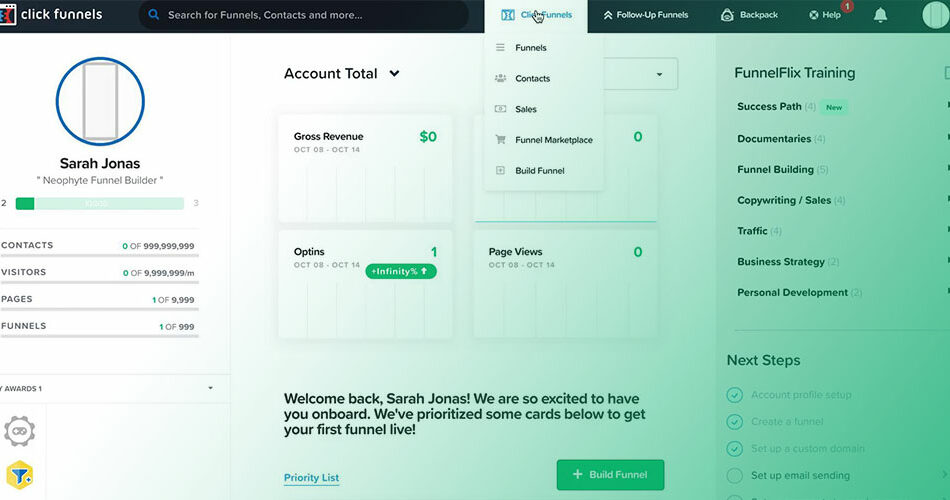Ever found yourself paddling in the digital ocean, grappling with the choice of raft—that vital vessel to sail you to online success? And two titans have caught your eye: ClickFunnels and WordPress. These aren’t just tools; they’re ecosystems, philosophies—one might say, ways of virtual life.
ClickFunnels wields the allure of high-converting sales funnels and landing pages, making it the siren song for marketers thirsting for streamlined conversions.
On the flip shore, WordPress, with its powerful content management system, invites creators into an expansive universe of themes and plugins. Each platform whispers promises of digital glory: increased leads, sales, and an online presence that could turn heads.
In the quest to build online empires, picking the cornerstone becomes more than a mere decision; it’s pivotal.
This delve isn’t just about comparing two giants—it’s about aligning stars for your online journey.
By article’s end, you’ll navigate beyond the fog, understanding each platform’s capabilities from funnel analytics to e-commerce functionality—no compass required. Dive in, and chart a course to your own slice of digital territory, tailored by insights, not guesswork.
Understanding ClickFunnels

Imagine ClickFunnels as your personal assistant who walks your visitors through your online store, suggesting what to look at, what to consider buying, and then swiftly takes them to the cash register.
It’s a dedicated tool to build conversion-optimized pages that guide potential customers through your sales process in the most efficient way.
Key Features of ClickFunnels
Funnel Templates
ClickFunnels offers pre-made funnel templates. It’s like having a blueprint for a successful sales process. They’ve got templates for different situations, so you can pick one, customize it a bit, and get going in no time.
Email Auto-Responder
Want to follow up with your customers without having to send a zillion emails manually? With ClickFunnels’ built-in autoresponder, you can automate the process, making sure your customers always feel connected.
Custom Domains
Wanna look professional? ClickFunnels allows you to have a custom domain. So instead of having “random123.clickfunnels.com”, you can have “your-awesome-business.com”.
Built-in Social Sharing
Social media’s the new word-of-mouth. And ClickFunnels has it built-in. It’s like having a group of promoters spreading the word about your business online.
Pros and Cons of ClickFunnels
Just like everything in life, ClickFunnels isn’t perfect. It’s got its strong points, like being super simple to use and having an all-in-one approach to online sales.
But it also has its downsides, such as being more expensive compared to other platforms, and not being as customizable as you might want.
Understanding WordPress
Now, let’s switch lanes and talk about WordPress. Picture WordPress as a virtual Lego set.
You’ve got blocks of different shapes and sizes, and you’re free to create anything you fancy. It’s a platform where you can build and manage your own website or blog.
And you know what?
It’s the system behind more than a third of all websites out there!
Key Features of WordPress
Massive Plugin Market
You know what’s great about Lego? You can always add more pieces! WordPress has a ginormous market of plugins.
These are like mini-apps that give your website superpowers. From SEO to social media sharing, there’s a plugin for pretty much everything.
Beautiful Themes

Starting with a blank canvas can be intimidating. That’s why WordPress offers a bunch of themes. These are like ready-made designs you can use as a starting point. And boy, are they gorgeous!
Customizable Codes
For the creative souls out there, WordPress lets you play around with the code. You can tweak and twist every part of your website until it looks and works just right.
Content Editor

And of course, a big part of having a website is the content, right? With WordPress’s content editor, crafting and formatting your blog posts or website text is a breeze.
Pros and Cons of WordPress
WordPress isn’t all rainbows and butterflies either. On one hand, it offers a level of flexibility and customization that’s hard to beat.
And it’s free to use!
But on the other hand, you’ll need to handle the hosting part. Plus, there can be a learning curve if you’re a total newbie.
ClickFunnels vs WordPress: A Detailed Comparison
Purpose: Sales Funnels vs Websites
The main difference between ClickFunnels and WordPress? One is specialized in building sales funnels, while the other is for creating websites.
Think of it like this: ClickFunnels is like a well-trained salesperson who guides your customers through the purchasing process. WordPress is like a virtual storefront where you display your products, tell your brand story, and interact with your visitors.
Pricing: Comparing Costs
When it comes to pricing, there’s quite a gap. ClickFunnels comes with a monthly fee, which includes all its features and hosting.
WordPress, on the other hand, is free to use, but you’ll need to pay for the hosting and might want to invest in some premium plugins or themes.
Onboarding: Ease of Use
In terms of getting started, ClickFunnels wins the game. It’s super easy to get a funnel up and running. WordPress, while not rocket science, requires a bit more tinkering and learning.
SEO Capabilities: Which is Better for SEO?
SEO, or Search Engine Optimization, is how you make friends with Google and other search engines. WordPress, with its powerful plugins like Yoast SEO, takes the crown in this area.
Community and Support: Comparing the Communities
Both platforms have strong communities and lots of support. Whether you prefer the dedicated support from ClickFunnels or the vast, user-generated support content for WordPress, you’ll never feel alone.
Customer Reviews: What Users Say

ClickFunnels users often praise its simplicity and efficiency. WordPress users love the flexibility and control they have. But of course, not everyone’s experience is the same. It’s always good to check out the reviews before deciding.
Use Cases: When to Use ClickFunnels vs WordPress
Scenarios for Using ClickFunnels
Imagine you’re selling a product or service online, and you want to streamline the buying process, making it as smooth as possible.
Or maybe you’re in a hurry to get a sales funnel up and running. In cases like these, ClickFunnels would be your go-to.
Scenarios for Using WordPress
On the other hand, if you want a full-blown website, something that showcases your brand, blog, or a range of products, WordPress would be your best bet.
It’s also perfect if you’re on a budget or if you like to get your hands dirty and customize your online presence to the smallest detail.
FAQ On ClickFunnels vs WordPress
Which is better for sales funnels, ClickFunnels or WordPress?
Ah, the golden query. ClickFunnels takes the trophy when talk turns to sales funnels. Built to boost conversions, it’s like a precision-crafted arrow zipping straight to the bullseye. Warm leads, clinched deals – ClickFunnels is the maestro of this symphony.
Can I use ClickFunnels with my WordPress site?
Sure can! Think of ClickFunnels and WordPress as coffee and cream – they just meld. A nifty plugin called ClickFunnels WordPress Integration ties the knot between your funnel and site, offering a seamless blend of marketing mojo and content richness.
Is ClickFunnels suitable for creating a blog like WordPress?
Well, here’s the scoop. ClickFunnels isn’t quite the blogging belle. Its soul sings sales, not storytelling. WordPress, on the other hand, struts its stuff on the blogging catwalk, dazzling with a constellation of customizations and SEO optimization tools.
Does WordPress offer better SEO capabilities than ClickFunnels?
WordPress doesn’t just offer SEO capabilities; it practically rolls out the red carpet for them. With its plugin ecosystem, especially Yoast SEO, it guides you like a trusty hound on the scent trail of top SERP spots.
Which platform offers more design flexibility, ClickFunnels or WordPress?
Flexibility, huh? Imagine WordPress as your open sandbox, where web design options stretch to the horizon. Need a unique look? Themes and page builders are your sandbox toys. ClickFunnels keeps it snug and efficient with its funnel templates, a bit tighter on the creative reins.
How do ClickFunnels and WordPress handle e-commerce?
ClickFunnels might help you with a quick sprint to the checkout line, laser-focused on the sell. WordPress, sporting WooCommerce, stands as a sturdy oak in the e-commerce forest, complete with branches for every conceivable online store need.
What about the cost difference between ClickFunnels and WordPress?
Cost talks. WordPress whispers sweet nothings to your wallet, being free as a base. But remember, add-ons can tally up. ClickFunnels? It asks for a hearty meal upfront with its monthly subscription, but for funnel aficionados, it’s a plate well-served.
Are ClickFunnels and WordPress suitable for beginners?
Fledglings flock to WordPress for its grand repository of knowledge and community support. It’s a gentle roost. ClickFunnels? It woos with a smooth learning curve, funnel templates ready to fly – an allure to the uninitiated.
How do analytics in ClickFunnels compare to WordPress?
Analytics, the compass of the digital sea—ClickFunnels equips you with funnel analytics, laser-pointed on conversions. WordPress, through plugins like Google Analytics, offers a universe of data, from page views to bounce rates—your digital map to user behavior.
Which has better third-party integrations, ClickFunnels or WordPress?
Oh, the playground of third-party integrations—WordPress romps in it. Its plugin directory is a treasure trove. ClickFunnels isn’t far behind with an impressive array of integrations, but WordPress? It’s the grand bazaar of connective possibilities.
Conclusion
Navigating the waters of ClickFunnels vs WordPress can leave minds swirling. Picture this: one path coasts along the shores of seamless sales funnels, where ClickFunnels reigns, a beacon for those chasing the siren calls of conversion optimization. On the flip side, a terrain sprawling with templates, plugins, and an open-source spirit, where WordPress stands tall like a lighthouse guiding content creators and bloggers.
Endgame? It’s all about the map etched onto your strategy and a compass wired to your goals. Whether the journey calls for a sleek vessel designed to capture leads with A/B testing precision or a trusty ship ready to be decked out in e-commerce functionality and a trove of SEO tools, the choice beckons.
Both buoyed by third-party integrations and powered by community winds, each platform offers a sail fit for particular cargo. Chart your course, weigh anchor, and sail on—towards the horizon of your digital expanse.
If you liked this article about ClickFunnels vs WordPress, you should check out this article about how to transfer a domain from WordPress to Shopify.
There are also similar articles discussing how to embed YouTube shorts in WordPress, why the WordPress site says coming soon, how to remove just another WordPress site, and how to add subheadings in WordPress.
And let’s not forget about articles on how to fix duplicate title tags in WordPress, where are theme options in WordPress, how to cancel a WordPress subscription, and how to uninstall WordPress from HostGator.

